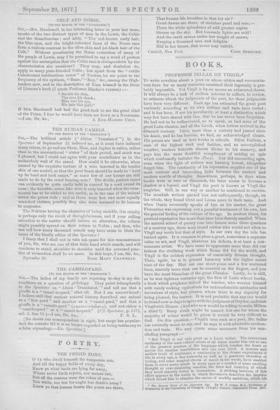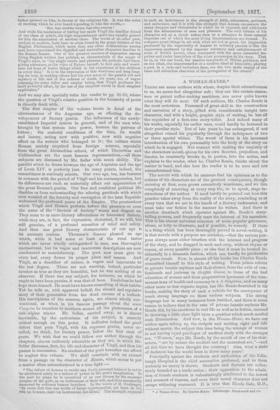BOOKS.
PROFESSOR SELLAR ON VIRGIL.* To write novelties about a poet on whom critics and commenta- tors have for so many centuries exercised their ingenuity is pro- bably impossible. Yet Virgil is by no means an exhausted theme. It will always be a task of endless interest to collect, to review, to estimate afresh the judgments of the past, for these judgments have been very different. Each age has estimated the great poet variously, according as its own culture and taste have varied ; and it has been, if not his peculiarity, at least a distinction which very few have shared with him, that he has never been forgotten. He had not to be rediscovered, so to speak, as had some of the great Latin classics, and all the Greek, when letters revived in the -fifteenth century. Little more than a century had passed since
his death, and he has become, we find, an acknowledged classic. His poems are used as text-books in schools. Sinus Italicus, a man of the highest rank and fashion, and an accomplished versifier, renders honours almost divine to his memory, and pays him the more doubtful compliment of writing an epic which confessedly imitates the zEneid. Nor did succeeding ages, even when the light of culture was burning lowest, altogether forget him. The continuity of his reputation supplies one of the most curious and interesting licks between the ancient and modern worlds of thought. Sometimes, perhaps, in days Wilea books were as rare as diamonds, his fame seems to become a.
shadow or a legend, and Virgil the poet is known as Virgil the
magician. Still, in one way or another he continued to survive. The monkish writers quoted him not unfrequently, though, on the whole, they found Ovid and Lucan more to their taste. And when Dante reverently speaks of him as his master, the great Florentine was expressing, not a peculiar sentiment of his own, but the general feeling of the culture of the age. In modern times, his poetical reputation has more than once been fiercely assailed. When the natural school of poetry rose into favour some three-quarters of a century ago, there were found critics who would not allow to. Virgil any merit but that of style. In our own day the tide has turned again. It is common to place a great, sometimes a supreme value on art, and Virgil, whatever his defects, is at least a con- summate artist. We have come to appreciate more than did our fathers the civilising work which Rome did for the world, and Virgil is the noblest expression of essentially Roman thought. Then, again, he is in general harmony with tho higher moral tone of the day. Blot out one short poem and a few scattered lines, scarcely more than can be counted on the fingers, and you have the most blameless of the great Classics. Lastly, he is still, as he was eighteen centuries ago, the first of Latin schoolbooks, a book which perplexes indeed the teacher, who wearies himself with vainly seeking equivalents for untranslateable intricacies and inversions of style, but pleases, where there is any capacity for being pleased, the learner. It is not probable that any one would be found now-a-days to agree with the judgment of Dryden, and rank Virgil with Homer. (And who now would be willing to make Milton a third ?) Many rivals might be named, but one for whom the majority of voices would be given it would be very difficult to find. On this question,—Virgil's true rank as a poet, Mr. Sellar has naturally much to say, and he says it with admirable modera- tion and taste. We may quote some sentences from his con- cluding paragraph :— " But Virgil is not only great as a Latin writer. The concurrent testimony of the most refined minds of all times marks him out as one of the greatest masters of the language which touches the heart or moves the manlier sensibilities who has over lived. A mature and mellow truth of sentin3ent, a conformity to the deeper experienees of life in every age, a fine humanity as well i RR a generous elevation of feeling, and some magical charm of music n his words, have enabled them to serve many minds in many ages as a symbol of some swelling thought or over.mastering emotion, the force and moaning of which they could scarcely define to themselves. A striking instance of this effect appears in the words in which Savonarola describea the impulse which forced him to abandon the career of worldly ambition, which his * The Roman Poets of the Augustan 4e By WY. Bellar, M.A., Professor of Humanity in the University of Glasgow. (Virgil.) Oxford: Clarendon Press. 1877.
father pressed on him, in favour of the religious life. It was the voice of warning which he over heard repeating to him the words,—
. Heu, rage crudities terms, tugs litus avarum And while his tenderness of feeling has made Virgil the familiar friend of one class of minds, his high magnanimous spirit has equally gained for him the admiration of another class. The words of no other poet, ancient or modem, have been so often heard in the groat debates of the English Parliament, which more than any other deliberations among men have reproduced the dignified and naaseuline eloquence familiar to the Roman Senate. One of the greatest masters of expression among living English writers has pointed, as characteristic of the magic of Virgits style, to his single words and phrases, his pathetic half-lines, giving utterance, as the voice of Nature herself, to that pain and weari- ness yet hope of better things which is the experience of her children in every time.' It is in the expression of this weariness and deep long- ing for rest, in making others feel his own sense of the painful toil and mystery of life and of the sadness of death, his sense, too, of vague yearning for some fuller and ampler being, that Virgil produces the most powerful effect, by the use °Ulla simplest words in their simplest application."
And we may also specially refer the reader to pp. 88-02, where the question of Virgil's relative position in the hierarchy of poets
is directly dealt with.
The first chapter of the volume treats in detail of the circumstances of the Augustan age, as affecting the de- velopement of literary genius. The influences of the newly- established Imperial system in general, and of the men who, brought by that system into power, became the patrons of letters; the material conditions of the time, its wealth and luxury, acting now with positive, now with negative (affect on the writers who belonged to it ; the culture which Roman society acquired from foreign sources, especially from the great Alexandrian school, of which Theocritus and Callimachus are the most famous representatives,—all these subjects are discussed by Mr. Seller with much ability. The parallel which he draws between the age of Augustus and the age of Louis XIV. is perfectly just. In many points, indeed, the resemblance is curiously minute. Our own age, too, has features in common with the period of Virgil and his contemporaries, but its differences are such as materially affect our appreciation of the great Roman's genius. Our free and confident political life
disables us from understanding the adoring gratitude with which amen wearied of the ferocity and corruption of the later Republic welcomed the profound peace of the Empire. The prostrations which Virgil and Horace perform before the presence or even the name of the "Saviour of Society" weary and disgust us. They seem to us mere literary affectations or interested flattery, 'while they are, in fact, the expression, rhetorical, if we will, but still genuine, of a profound sensation of relief and safety. And then one great literary characteristic of our age is its accurate realism. Thomson's Seasons pleased an age which, while it had some at least of the rural tastes
which are never wholly extinguished in man, was thoroughly unobservant, but its vague and inaccurate descriptions are now condemned as unsatisfactory. The poet now must give to every leaf, every flower its proper place and season. And Virgil, as a describer of nature, is vague and inaccurate to the last degree. There are not wanting, indeed, particular touches as true as they are beautiful, but he was nothing of an 'observer. If there was any subject, for instance, on which he ought to have been precise, it was that of bees. Doubtless he had kept them himself. He must have known something of their habits. "Yet he tells us, with apparent belielf, the absurd and repulsive story of their generation from the dead carcase of a bullock. His descriptions of the seasons, again, are almost wholly con-
ventional, as when in his famous passage about the senex Coryeius he transfers to southern scenes all the phenomena of a sub-Alpine winter. Mr. Seller, carried away, as is almost inevitable, by the enthusiasm of his subject, is scarcely -critical enough on this point. It indicates indeed the great defect that puts Virgil, with his supreme genius, never ex- celled, we think, for literary power, below the first rank of poets. We wish that we could follow our author through the 'chapters, almost uniformly admirable as they are, in which Mr.
Seller discusses, first, the life and character of Virgil, and then his poems in succession. No student of the poet hereafter can afford to neglect this volume. We htill conclude with an extract from a passage on the character of .Xneas, which seems to put a matter often misunderstood in a true light :—
"The failure of Aeneas to excite any lively personal interest is not to "be attributed solely to a failure of power in the poet's imagination. In the part he playa he is conceived of as one chosen by the supreme purpose of the gods, as an instrument of their will, and thus necessarily 'unmoved by ordinary human impulses. In the words of M. Coulanges, Sa vertu dolt 6tre une froido et haute impersonalitd, qui fame de lui, nen un bona we, male an instrument dos dieux.' The strength required in such an instrument is the strength of faith, submission, patience, and endurance, and it is with this strength that Aeneas encounters the many dangers and vicissitudes to which he is exposed, and withdraws from the allurements of ease and pleasure. The very virtues of hia character act as a cheek rather than as a stimulus to those natural impulses out of which the most living impersonations are formed. To compare groat things in art with what are not se great, the impression produced by the superiority of Aeneas to ordinary passion is like the impression produced by the superior tolerance and enlightenment of some of Scott's heroes, when contrasted with the more animated im- pulses and ruder fanaticism of the other personages in his story. That he is, on the one hand, the passive receptacle of Divine guidance, and on the other, the impersonation of a modern ideal of humanity, playing a part in a rude and turbulent time, are the two main causes of the tame and colourless character of the protagonist of the Aeneid."



































 Previous page
Previous page